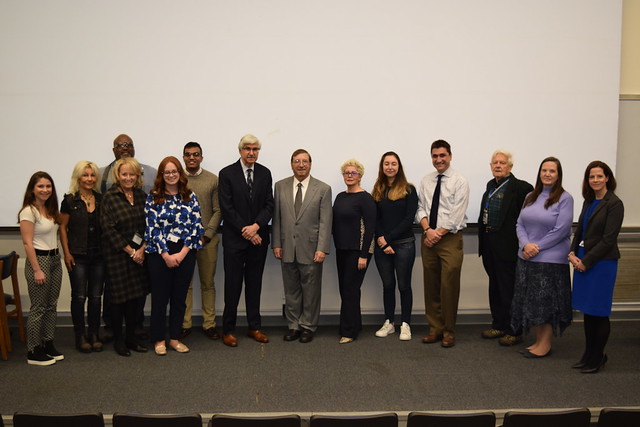Accessibility Awareness and Education Lecture Focuses on Diabetes for National Diabetes Awareness Month
As part of its Accessibility Awareness and Education Lecture Series, the Office of Academic Support hosted a special presentation on diabetes by Jerry L. Nadler, M.D., MACP, FAHA, FACE, seventh from left, dean of the School of Medicine and professor of medicine and pharmacology.

Dr. Nadler, an internationally recognized diabetes physician-researcher who is working to determine if a vaccine could prevent Type 1 diabetes, shared his expertise on the disease that is expected to affect 629 million people worldwide by the year 2045 according to the International Diabetes Federation.
Dr. Nadler began his presentation with a nod to the important historical role New York Medical College (NYMC) has played in the field of diabetes citing former NYMC Dean Israel S. Kleiner, Ph.D., who is credited as being the first to demonstrate the effect of extracts from the pancreas causing hypoglycemia which eventually helped lead to the discovery of insulin, and former Chair of the Department of Medicine Rachmiel Levine, M.D., who was a mentor of Dr. Nadler and is considered the father of modern diabetes research for his theory on glucose transport, coined the “Levine Effect.”
Dr. Nadler’s presentation covered the difference between Type 1 and Type 2 diabetes, the major risk factors such as obesity and visceral fat, complications from the disease and treatment including diet. He discussed the promising research for diabetes prevention including a vaccine and determining an environmental trigger since diabetes has no single gene associated with it, as well as innovations in the future treatment including closed loop insulin pumps.
The event also featured Dennis Paul, sixth from left, a student in the Accelerated Master’s Program (AMP) in the Graduate School of Basic Medical Sciences, who shared his personal story living with Type 1 diabetes. Mr. Paul, whose goal is to be an endocrinologist and treat patients with diabetes, spoke of his challenge accepting his diagnosis at a young age and the advance in treatment options he has benefitted from over the years.
Diabetes is a chronic condition covered under the Americans with Disabilities Act (ADA), thus affording qualified students accommodations for an equal opportunity to benefit from the educational process, explained Megan Siemers-Livingston, M.S.Ed., academic support specialist and director of accommodations and accessibility in the Office of Academic Support.
The NYMC community gathered for a group photo to show their support for National Diabetes Awareness Month in November at the beginning of the presentation.


